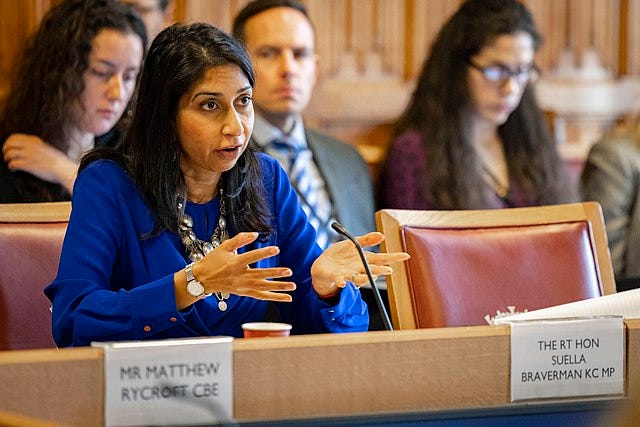Britain and the Heretics in the Truth
How British progressivism has eroded the nation's freedom of speech
Amjad Alrubayan came to Britain seeking asylum from the Islamic dictatorship of Saudi Arabia, where atheism is illegal and nonbelievers like himself are put to death, but he never imagined he would end up in jail in a supposedly liberal democracy for expressing his opposition to theocratic brutality.
When he arrived in June 2022, Alrubayan was put in a hotel for asylum seekers in Manchester, the great city of the north and the world’s first industrialized city.
Manchester was a battleground for free speech in the 1890s, when anarchist communists were arrested for holding open-air meetings on Ardwick Green. C.P. Scott, then editor of the Manchester Guardian, later The Guardian, rejected their views but defended their right to express them. Manchester was also where an Islamist terrorist bombed an Ariana Grande concert in May 2017, killing 23 people and injuring over 800 in the deadliest terrorist attack on British soil since the London bombings of 2005.
You might therefore think Manchester would be a place where free speech has robust defenders while Islamist violence has none. Alrubayan certainly thought so.
But on August 29, Manchester police showed up at his door and arrested Alrubayan for the crime of criticizing Islam on social media.
“Since my arrival to Britain, I began exercising my freedom of expression by criticizing Islam and other religions, which I personally suffered from and which billions suffer from every day, on my Twitter and TikTok accounts,” he told me.
In particular, Amjad opposes the way people use Islam to justify terroristic violence and the unscientific understanding of the world that the faith presents to adherents. His mistake was assuming that the home of Isaac Newton and Francis Bacon still harbors respect for the principles of the scientific revolution and Enlightenment ideals.
Unfortunately, Alrubayan’s is not an isolated example.
In April 2018, a 19-year-old girl from Liverpool was prosecuted and found guilty of a hate crime for posting rap lyrics on Instagram to pay tribute to her friend, a 13-year-old boy who had recently been killed in a road crash.
In a recent report for The Free Press titled “British Police ‘Are Giving in to the Mob’,” Rupa Subramanya notes multiple other examples, such as a man who posted a video on Twitter on October 17 of a street in East London decorated with Palestinian flags, commenting, “You let them into the country, and this is the shit they come up with.”
Police showed up at his apartment two weeks later and arrested him on suspicion of a “racially aggravated offense,” saying it was because he had been witnessed remarking, “Why are they over here?” and “We let them into our country.”
So far, it is still legal to vote for the far-right populist UK Independence Party, which opposes further immigration and rejects multiculturalism.
Subramanya also noted British police forced a Jewish nonprofit to stop showing images on vans of Israeli children kidnapped by Hamas for allegedly “breaching the peace.” Back in Manchester, a police officer tore down posters of kidnapped Israeli children. Amina Ahmed, leadership coordinator at Scotland Yard, the headquarters for London’s Metropolitan Police, said support for Israel should be a hate crime. Pro-Palestinian activists at Trafalgar Square assaulted the journalist Arul Velusamy as police looked on. Police told a group of aging veterans to remove their British flags from barricades but said they would not regulate the hundreds of Palestinian flags.
These examples, and many more like them, prompted Britain’s home secretary Suella Braverman, in charge of immigration, to write an opinion essay for The Times in which she argued that police ought to be even-handed with protesters:
Right-wing and nationalist protesters who engage in aggression are rightly met with a stern response yet pro-Palestinian mobs displaying almost identical behaviour are largely ignored, even when clearly breaking the law? I have spoken to serving and former police officers who have noted this double standard.
For this principled and softly spoken stand, Braverman was fired on November 13.
In his post, “I, For One, Welcome Our New Labour Overlords,” Konstantin Kisin wrote:
Braverman dared to suggest that the police are not enforcing the law in a balanced way. As an example, she raised the disparity between the way BLM protestors were policed during the summer of 2020 when coppers routinely kneeled in front of them…and the way anti-lockdown protestors were treated only months later when the police kneeled on them.
So far, so inflammatory. She also went on to say that the public expect to see upcoming anti-Israel protests in London to be properly policed.
Much to the chagrin of Kisin and myself, the public did not get what they rightfully expected. And as Kisin has pointed out elsewhere, this is part of far larger pattern, driven by woke progressive politics, that has gotten so bad that in 2017, Russia opened 411 criminal cases against internet users while in the UK that year, 3,395 arrests were made for “section 127” offences, which is used for cases of online abuse.
This is particularly dispiriting because of the UK’s glorious history of free speech ideals. If these events were taking place in Saudi Arabia or China, we might sigh in sympathy and shrug in helplessness, then turn the page and move on. But it was the English poet John Milton who penned the 1644 pamphlet Areopagitica, one of the greatest philosophical defenses of freedom of speech ever written.
The greatest jurist of the Elizabethan and Jacobean eras was a man named Edward Coke, one of the most powerful defenders of free speech in the history of European law. Then you have the Protestation of 1621, in which the House of Commons asserted their right to free speech even against the will of the king himself, James I, who felt they had no right to discuss foreign policy. Then there’s the English Bill of Rights 1689, which established a constitutional right to freedom of speech in Parliament.
In the United States, where we are rightly proud of our free speech protections—and like Britain, rapidly letting them slip away—our First Amendment and the entire Bill of Rights is built upon ideas expressed earlier in the Magna Carta of 1215 and the English Bill of Rights in 1689.
Milton wrote Areopagitica in response to Parliament re-introducing requirements that publishers needed government licensing. In 1637, seven years before he wrote his pamphlet, the British crown had restricted the right to print to two universities and 21 printers in London. The Star Chamber was established to limit “contentyous and disorderlye persons professinge the arte or mystere of pryntinge or selling of books.”
It was much like social media. Anyone who could get their hands on a printer could publish their opinions to the world and the British monarchy recognized that allowing people to do so was a serious check on power.
Milton had previously written an essay on the right to divorce, which the Catholic Church blocked by having his publication license refused. In Areopagitica, which he published without a license, Milton argued that free speech should be tolerated, even if it meant allowing offensive opinions or lies to spread, because you first had to look at every idea before you could reasonably figure out which ones were best.
His argument was that free speech was not merely a luxury but a means of understanding the world, an instrument of education, and of good governance, since it helped keep the powers that be in line. If you control what people can say, then you control what ideas they are exposed to and therefore what they think. As he put it:
Give me the liberty to know, to utter, and to argue freely according to conscience, above all liberties.
In another passage, Milton explains how one can become a “heretic in the truth,” one who is scorned for speaking honestly, or what we would today call a victim of cancel culture, while on the other hand, one can believe in the things they are supposed to believe, but if those things are false, they may become nothing more than honest liars:
A man may be a heretic in the truth, and if he believe things only because his pastor says so, or the assembly so determines, without knowing other reason, though his belief be true, yet the very truth he holds becomes his heresy.
John Locke, who lived at the same time as Milton, was also a great champion of free speech, although he was less interested in using it to obtain information or regulate government than to develop the individual self and achieve spiritual salvation.
Both men, two of the greatest minds the UK ever produced, considered free speech, for different reasons, as the greatest of all freedoms requiring the strongest of all protections.
The worst part, of course, is that we are throwing pearls to swine, offering unwarranted elbow room to violent thugs and genocidal assholes who, if you actually were inclined to censor speech, surely theirs would be at the top of your list.
This is a recurring problem Western democracies face and have not yet figured out how to navigate. Our freedom and tolerance are our greatest strengths but also our fatal flaw.
We treat Chinese “journalists” as if they are not in fact spies, meanwhile China bans our legitimate journalists as well as entire news outlets. We afford pro-Palestinian activists levels of freedom and tolerance that they, and in particular the people for whom they advocate, would never grant us. We bend over backwards trying to reason and negotiate with people who want nothing but to stand on our graves. As Paul Bryan at Liverpolitan wrote in his insightful coverage of the Braverman debacle:
A prized peace cannot hold in the iron grip of absolutism. For all the blood and rubble, you cannot negotiate with someone whose only vision of the future is wanting you dead and gone.
Our own tolerance and liberties are being weaponized against us, and while bad actors take advantage of our good faith and beat us over the head with our own hospitality, truth-tellers such as Braverman and good actors like Alrubayan are left turning in the wind. If we are ever to defeat our enemies, we must first acknowledge that we have enemies, that these people are not our friends, and we must then stand strong for the things in which we believe.
Allowing free speech to erode in the name of tolerance ends up making fewer people safe, not more. It is only because we have free speech that we can afford to be tolerant in the first place. Hopefully, Britain will find its way before it’s too late.
Alrubayan was arrested on charges of hate speech against Muslims. Manchester police confiscated his mobile phone and asked him for the password, but he refused. As a result of his arrest, he was kicked out of the asylum hotel where he had been living with his brother and made homeless for a day.
He found a new hotel soon after, but has not yet received his clothing and belongings from his old room. His phone is still being held by Manchester police.
“What happened to me was very shocking,” Alrubayan said. “Even my British friends were shocked.”
If you’d like to hear Alrubayan tell his own story in more detail, as well as yours truly discussing the subject of religion with him, please see the audio file below.





